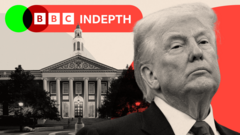The recent clash between former President Donald Trump and Harvard University highlights a significant shift in the relationship between politics and higher education in the United States. Over a span of just seven days, Trump issued threats to redirect billions in federal research funding to vocational schools, directed federal agencies to reassess contracts with Harvard, and escalated rhetoric about the university's alleged disrespect towards the nation. This series of moves is seen as a direct assault on one of the nation’s most prestigious institutions, reflecting a broader conservative campaign aimed at reshaping the educational landscape.
Students at Harvard expressed anxiety over these developments, with many feeling that if Trump's actions could impact such a prominent university, similar repercussions could occur across the American higher education system. A British graduate remarked, “It feels like the nuclear option.” This sentiment indicates a growing concern about academic freedom amidst political pressures.
The administration’s justification for its actions centers around accusations of antisemitism on campus, particularly following recent protests linked to the Gaza conflict. Trump's scrutiny intensified after university leaders struggled to categorically denounce antisemitic sentiments during congressional hearings. The administration has since called for comprehensive reforms in university policies, including eliminating diversity programs and screening foreign students for potentially hostile views.
Critics argue that this aggressive stance is indicative of an effort by conservatives to diminish the influence of institutions that traditionally support liberal values, positioning the fight over university policies as a crucial battle in America’s culture wars. Trump's supportive base sees this as a necessary confrontation against what they perceive as leftist indoctrination within educational institutions. Prominent conservative figures have long deemed universities as bastions of liberalism that need reform.
While institutions like Harvard resist these efforts through legal challenges, the broader implications of Trump’s strategy remain uncertain. Reports indicate that other significant universities, such as Princeton and the University of Pennsylvania, have also been subject to funding cuts and grievances, indicating a wider campaign against elite higher education.
Some educators caution that chronic antagonism towards higher education could ultimately undermine the benefits of diversity within academic communities. The stakes are high: Trump’s administration might view funding leverage as a tool for ideological change, while educators fear the lasting impact on academic independence and freedom of thought.
As the battle unfolds, public opinion appears divided, with a majority supporting universities but also aligning with Trump's base in his critiques. The challenge remains whether universities can adapt to these pressures or if they will be permanently altered by the political landscape, marking a dramatic transformation in the educational framework of America.
In summary, Trump’s relentless focus on Harvard signals not only a personal vendetta but potentially heralds a much larger shift in the dynamic between politics and academia in the U.S., one that threatens to reshape the future landscape of higher education.



















